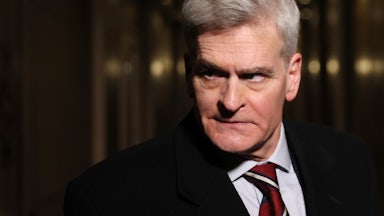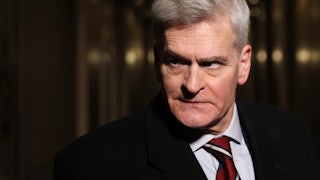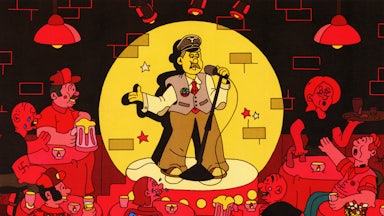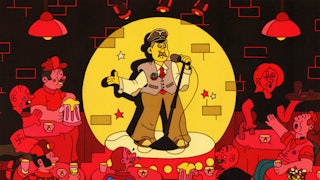In July 2017, Donald Trump gave a speech in Warsaw that seemed, at the time, to herald a new age. In remarks dredged from the imagination of adviser Steve Bannon, the president drew a rhetorical line in the sand and enlisted his host—the Eurosceptic, right-wing populist Polish President Andrzej Duda—in an epochal fight. “I declare today for the world to hear,” Trump said, as if he were standing behind ramparts and not a podium, “that the West will never, ever be broken. Our values will prevail. Our people will thrive. And our civilization will triumph.”
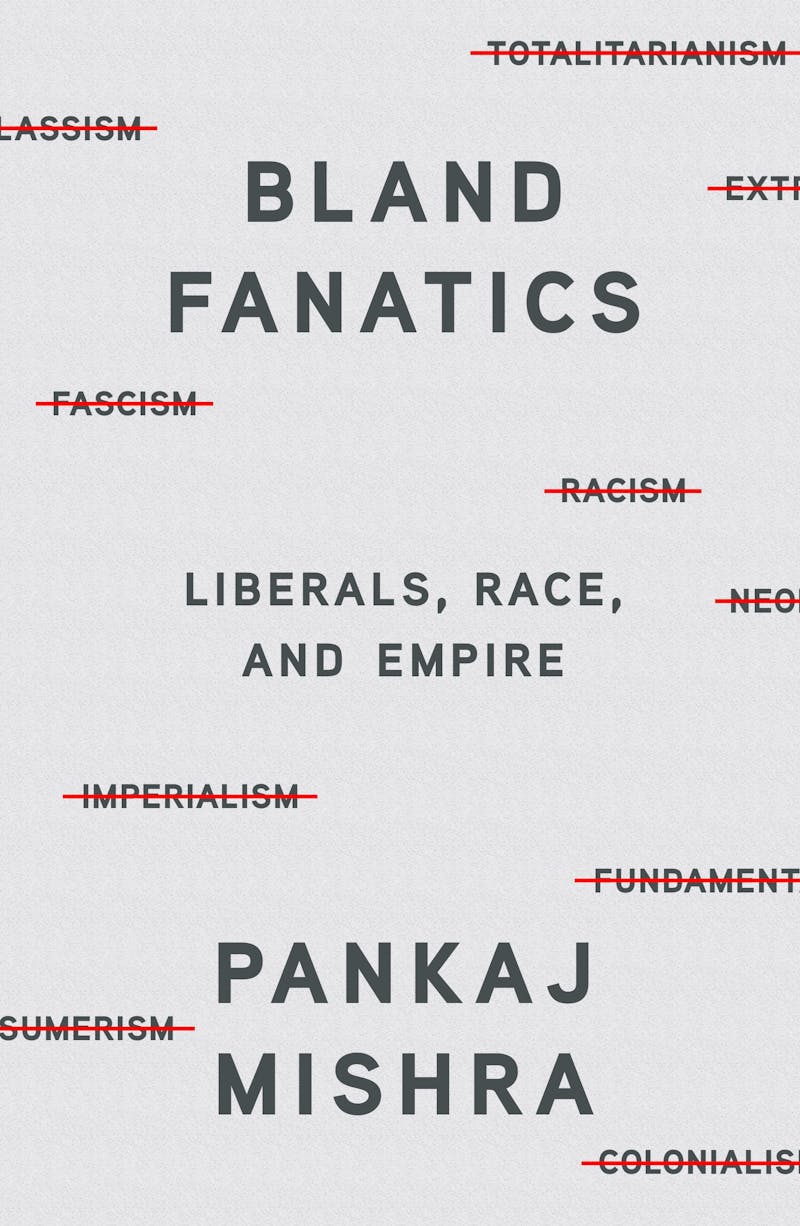
Trump struck the pose of a defender of an embattled cause, invoking Poland’s history of repeated invasion by foreign aggressors. But who was this paladin of the West going to protect civilization from? The danger of “radical Islamic terrorism” merited one mention, as did the scourge of “government bureaucracy” (never underestimate the apocalyptic peril of regulation); for the most part, the speech was fairly vague in pinpointing the enemy. “This continent no longer confronts the specter of communism,” Trump said, “but today we’re in the West, and we have to say there are dire threats to our security and to our way of life.” Less than 0.1 percent of Poland’s population is Muslim, and the country has yet to experience an Islamist terrorist attack. But the exact nature of the menace mattered far less than the fact that a menace existed—and that Trump and other right-wing leaders had the courage to do something about it.
The speech alarmed many liberal critics back in the United States, who suspected with reason that the president’s rhetoric signaled encouragement to white supremacists (the infamous, murderous neo-Nazi rally in Charlottesville would occur later that summer). Writing in The Atlantic, Peter Beinart insisted that invocations of civilization were coded appeals to racial identity. He was surely right. But for all Trump’s strident language and its dark echoes, his address did not constitute some kind of norm-shattering departure from the rhetoric of presidents past. As the conservative writer Marc Thiessen pointed out in The Washington Post, U.S. presidents of both parties all the way from Harry Truman to Bill Clinton had dutifully invoked the sanctity of Western civilization. Clinton, basking in the heady certainty that followed the end of the Cold War, said in 1994 that “Western civilization was the greatest of all, and America was the best expression of Western civilization.”
One of the unfortunate temptations of the Trump era has been the rush to find radical breaks with the past where, in truth, the lines of continuity are strong. The themes of Trump’s speech were already well circulated among the Anglo-American elite, whether in the work of the political scientist Samuel Huntington or in the pages of the British political magazine The Spectator. “Invocations of the free world and talk of Western values came into vogue during the Cold War, and were meant to assert Western democracy’s superiority over Communism,” the left-wing Indian critic Pankaj Mishra wrote for Bloomberg.com at the time. “They were never very convincing even back then: The free world often supported brutal dictatorships, quickly discarding its values when it felt the need.” The president only did what so many previous European and American leaders have done, draping themselves in the mantle of culture to inveigh against an amorphous other. Appeals to Western values “invoke grand moral and political communities,” Mishra wrote. “But these imagined communities appear cohesive only so long as they can clearly identify an antagonist.”
Much of Mishra’s career has been spent rewriting that imagined “antagonist” into the history of liberalism. In Bland Fanatics, his latest collection of essays, Mishra notes that “racial exclusion has long been central to liberal universalism.” The 16 essays in the collection touch on numerous subjects—including modern reckonings with slavery and race in the United States, the life and legacy of the nineteenth-century Russian intellectual Alexander Herzen, the meaning of World War I, and the fascist mysticism of the popular Canadian psychology professor Jordan Peterson—but together advance Mishra’s rereading of the history of the twentieth century. The world looks rather different if you see the central event of the past 100 years not as the contest between Western liberalism and its antonyms, but rather, as Mishra does, the tumultuous process of decolonization, which reshaped the lives of most people on the planet.
For nearly three decades, Mishra has skewered the pieties of politicians and intellectuals in the Anglophone world (including India, which boasts more English speakers than the United Kingdom), while also bringing his spirited attention to the histories and imaginations of people outside circles of wealth and power. The scales first fell from his eyes during his travels and reporting in Kashmir in the late 1990s and early 2000s. In the disputed Indian-administered territory, he saw firsthand the collision between India’s pluralist liberal democracy—its avowed commitment to democratic norms, individual rights, and multiculturalism—and the reality of military occupation. Indian apologia for abuses in Kashmir, he writes, “prepared me for the spectacle of a liberal intelligentsia cheerleading the war for ‘human rights’ in Iraq, with the kind of humanitarian rhetoric about freedom, democracy and progress that was originally heard from European imperialists in the nineteenth century.” The remit of Mishra’s work has grown steadily wider over the decades, from an early focus on the dreams and catastrophes of small-town India, to a thoughtful exploration of colonial-era Asian intellectual history in the excellent From the Ruins of Empire (2012), to the sweeping global jurisdiction of his recent books, which directly confront the international order made by the United Kingdom and the United States.
He is steeped in an Indian (and broadly non-Western) intellectual tradition of anti-colonialism that has long highlighted the gulf between the West’s espoused beliefs and the reality of its conduct. The institutions that put nineteenth-century Western powers in a position to rule over vast swaths of the earth—nationalism, centralized bureaucracies, efficient armies, and the capacity to mobilize vast resources—had little to do with the rights of the individual. In the eyes of many non-Westerners, Mishra writes, “liberalism seemed attractive largely because it promised to advance the urgent project of state-led modernization”—a modernization that would better protect them from the threat of ostensibly liberal empires. The early–twentieth-century Chinese thinker Yan Fu claimed that the genius of the West lay in its ability to channel “individual energy into national strength.” Imperial expansion throughout this period (including that by the Japanese) enacted this very tension, with strong states merrily quashing individuals in the service of colonial fantasy.
And then there was the blood. On the centenary of the end of World War I, Mishra lamented how “the war has been remembered as a great rupture in modern Western civilization, an inexplicable catastrophe that highly civilized European powers sleepwalked into after the ‘long peace’ of the nineteenth century.” That reading forgets the apocalyptic violence Western powers brought to other parts of the world in the years before the war. Mishra sketches a sample accounting of the grisly toll of empire: the 200,000 Filipinos the United States killed during its colonial wars in the early twentieth century (in which 26 of 30 U.S. generals had also served in wars against Native Americans), how the Germans slaughtered 88 percent of the Herero people in Southern Africa, and the eight million people who died in Belgian-administered Congo. (He might have mentioned the tens of millions of Indians lost to famines under British colonial rule, death at a scale that dwarfs the number of Ukrainians killed by Stalin’s Holodomor in the 1930s.) A tenuous peace held between the great powers during the interwar period, but the carnage continued elsewhere. Arthur Harris, the British air force officer who led the firebombing of Dresden during World War II, laid waste to northern Iraq in 1924. “The Arab and Kurd now know what real bombing means,” Harris proclaimed in a Royal Air Force report at the time. “They now know that within 45 minutes a full-sized village … can be practically wiped out and a third of its inhabitants killed or injured.”
Europeans and North Americans are learning more about this gruesome past, but the history of the West’s dealings with the rest remains largely submerged in a gray zone, allowed little of the harsh light cast on the traditional villains of the modern era (Hitler, Stalin, Mao, and so on). Western colonial abuses are still treated as a footnote, a sideshow to the main action of the twentieth century: the confrontation between liberalism and authoritarianism that emerged through the world wars and the Cold War. And they must be treated in this way for the rest of the narrative to cohere and for the binary between liberty and tyranny to take shape.
Mishra insists that liberalism cannot so easily shed this baggage. The chaos, violence, and snarling ideologies of imperial rule in Africa, Asia, and Latin America fed directly into the wars that would dismember and reshape the world. Colonies, Mishra writes, were “the crucible where the sinister tactics of Europe’s brutal twentieth-century wars—racial extermination, forced population transfers, contempt for civilian lives—were first forged.” The German Jewish philosopher Hannah Arendt recognized this in her 1951 classic The Origins of Totalitarianism, where she described how Europeans reordered “humanity into master and slave races” in ways that prefigured the decimation of the world wars and the Holocaust. But as Mishra points out, anti-colonial thinkers in Asia such as the Chinese reformer Liang Qichao and the Indian writer Aurobindo Ghose had already come to that conclusion decades before Arendt, keenly seeing how the West’s brutality overseas now consumed it in the inferno of World War I. “The experience of mass death and destruction, suffered by most Europeans only after 1914, was first widely known in Asia and Africa, where land and resources were forcefully usurped, economic and cultural infrastructure was systematically destroyed, and entire populations were eliminated with the help of up-to-date bureaucracies,” Mishra writes. “Europe’s equilibrium was parasitic for too long on disequilibrium elsewhere.”
That dynamic persisted into the Cold War, as the contest between the West and the Soviet Union—between the enlightened liberal world and the fallen authoritarian one—obscured the widespread violence perpetrated on behalf of liberalism in the twentieth century, in killing fields as varied as Indonesia, Congo, and Nicaragua. And it continued—even accelerated—after the collapse of the Soviet Union, when the United States embraced a far more militarized foreign policy, leading to nearly 200 military interventions since 1992 (the United States conducted around 50 military interventions between the end of World War II and 1991). Thanks to both education and cultural insularity, people in the West (and in the United States in particular) often struggle to see just how entangled they are in the world. The greatest contribution of Mishra’s work is its indefatigable insistence that places long considered marginal belong in the foreground of modern political history. He isn’t just interested in righting the balance between the West and the rest; he questions whether one can even separate the two.
What distinguishes Mishra’s energetic and often pugilistic writing is not necessarily the point of its attack—the withering, if familiar, broadsides against the callous actions of Western powers and postcolonial states—but rather its angle. Mishra sees the present as a historian; the tremors on the surface reveal deep currents. In an especially merciless piece on Brexit, for instance, he compares Britain’s departure from the European Union to the country’s retreat from empire and consequent loss of identity, showing how the ineptitude of colonial-era Britons abroad now defines the split from Europe. “The malign incompetence of the Brexiteers,” he writes, “was precisely prefigured during Britain’s exit from India in 1947, most strikingly in the lack of orderly preparation for it.” The same class of posh “eternal schoolboys” that crafted the disastrous partition of India—resulting in upwards of a million deaths—now aspired to cleave the country from Europe. “Ordinary British people stand to suffer from the untreatable exit wounds once inflicted by Britain’s bumbling chumocrats on millions of Asians and Africans.”
In other essays, Mishra reminds readers that The Economist supported the Confederacy in the nineteenth century and hailed the rise of Mussolini in the twentieth. (The magazine would also offer its backing to the 2003 U.S. invasion of Iraq.) And he recounts the bigotry that underlay the internationalism of President Woodrow Wilson (a legacy that recently saw the president’s name scrubbed from Princeton’s School of Public and International Affairs) as a harbinger for future interventions in the name of liberal values. The New Republic, Mishra notes acidly, described President George W. Bush in buoyant terms after U.S. troops entered Iraq as “the most Wilsonian president since Wilson himself.”
Instinctively a comparativist, Mishra traces connections and patterns across time and space. The title essay of Bland Fanatics, for example, draws the astute parallel between the experiences of industrialization in many Asian countries after World War II and of industrialization in Europe in the nineteenth century. Many of liberalism’s evangelists—figures Mishra calls “bland fanatics,” borrowing from the American theologian Reinhold Niebuhr—in the twentieth century imagined its spread as preordained. But Mishra insists that liberalism was always highly contingent; liberal political systems have very rarely emerged in sync with liberal economic ones. The secret of the success of the poster children of liberalism—the United Kingdom and the United States—was the “surplus value and resources” won through “imperial domination.” Other states that lacked those imperial advantages had to pursue different paths. In much of nineteenth-century Europe and in postwar Asia, modernization and state-building occurred largely under autocratic conditions, guarded by robust protectionist policies, and with little protection of personal liberties. Mishra is fond of this sort of deft grafting of two distinct histories, offering a revisionist understanding of both, a reminder that liberalism’s ostensible successes often owed very little to liberalism.
Moral clarity about the colonial era still inspires blowback from those unwilling to tolerate significant revisions to the record. In the United Kingdom, Conservative politicians have spoken about the ills of “critical race theory” and rallied around figures such as Prime Minister Winston Churchill, who is venerated for defeating the Nazis and regarded as the consummate exemplar of Anglo-Saxon resolve, but whose hagiography many Britons no longer accept. American conservatives have developed a fixation with The New York Times’ 1619 Project, which reframes U.S. history in terms of slavery and racial injustice, identifying the arrival of slave ships in 1619 as the country’s original sin. Trump tried to harness unease with the project during his unsuccessful reelection bid (pledging to launch a “1776 Commission” counter-Reformation), while Rod Dreher, writing in the New York Post, went so far as to cite Arendt (a darling of opinion writers of almost every political stripe) when he blamed the 1619 Project for the imminent arrival of “totalitarian tyranny.”
One imagines that these reactionaries will supply Mishra with a good deal of fuel for future columns. But it is unlikely that he will find as consummate an adversary as the British historian Niall Ferguson, the subject of the opening essay of Bland Fanatics. Few figures concentrate Mishra’s ire better than Ferguson—an apologist for British empire, a zealous supporter of the 2003 Iraq War, a proponent of the untrammeled spread of free markets, and a salesman of repackaged notions of Western cultural superiority. Their feud in the pages of the London Review of Books a decade ago helped shoot Mishra to greater prominence and further banish Ferguson from the circles of polite liberal conversation.
The spat with Ferguson points to a potentially uncomfortable fact for Mishra, who styles himself as an outsider speaking truth to an insensible and irredeemable establishment. In some respects, he is winning; his views are sliding into the mainstream. Ferguson may hop from one comfortable sinecure to another, but he no longer has the influence and ubiquity he enjoyed at the turn of the century, when he supplied the gloss of epochal purpose to Bush’s diabolical invasion of Iraq. Indeed, Americans have far less appetite now for the liberal interventionism of that era. Condemning the Iraq War has become a rote piety of American political life. Proponents of retrenchment and critics of U.S. hegemony enjoy more space both in prestige publications such as The New York Times and Foreign Affairs and in conversations on the Beltway. An American politician of the conviction and popularity of the democratic socialist Alexandria Ocasio-Cortez would have been unimaginable 20 years ago, when Mishra was clarifying his doubts about liberalism. Even heterodox ideas about the economy, such as modern monetary theory, are winning more adherents. A new generation of writers and scholars—the political theorist Adom Getachew, the legal scholar Samuel Moyn, and historians Stephen Wertheim, Quinn Slobodian, and Priya Satia, to name just a few—manages with greater patience and detail than Mishra to pick apart the assumptions and certainties of the liberal order.
But what Mishra’s essays lack in granularity they make up in vigor and scope. He challenges his readers to broaden their frames of reference, to see their worlds as inextricable from those of others. No other writer in the English language can offer such a bracing, global understanding of the specious conceits of our times.

